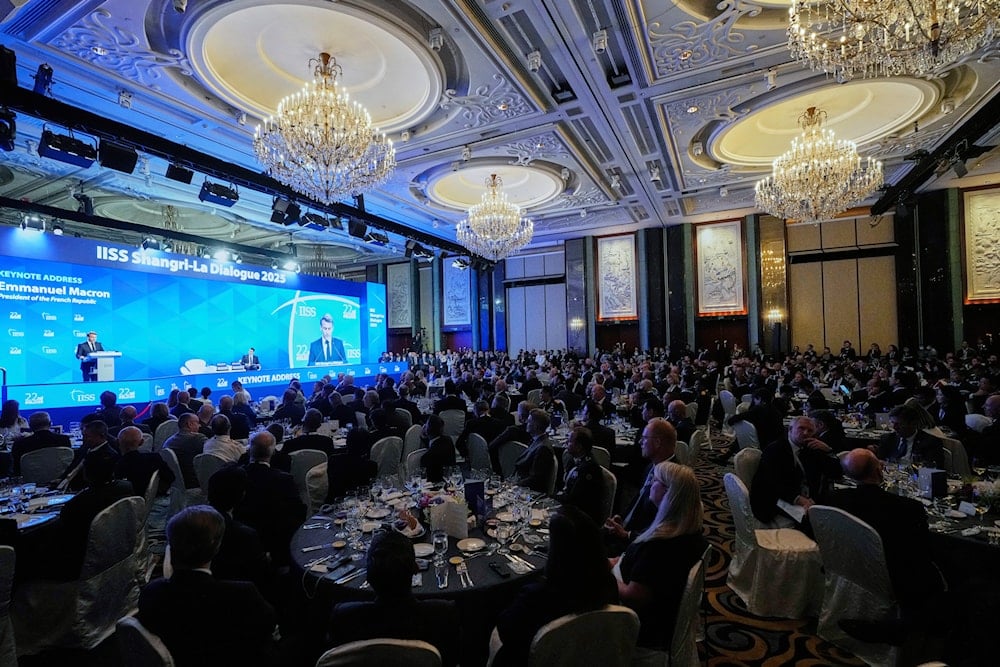EU: China-Russia ties threaten global order
European leaders seek deeper ties with Indo-Pacific nations, promoting multilateral security, fair trade, and resistance to coercion amid rising global tensions.
-

French President Emmanuel Macron delivers his speech during the 22nd Shangri-La Dialogue summit in Singapore, Friday, May 30, 2025. (AP)
European leaders visiting Asia this week issued strong warnings about what they perceive as growing strategic alignment between China and Russia, framing it as the world’s most pressing geopolitical challenge.
Speaking at the Shangri-La Dialogue in Singapore on Saturday, European Union foreign policy chief Kaja Kallas said, “It is the greatest challenge of our time,” referring to deepening cooperation between Moscow and Beijing. She warned that joint efforts to revise the global security architecture should alarm the international community.
Kallas accused China of actively supporting Russia’s military efforts in Ukraine, claiming that 80% of dual-use goods aiding Moscow’s war machine originate from China. Western officials also allege that China has supplied critical technologies, such as drones, and has worked in tandem with Russia on cyberattacks and acts of sabotage.
“If you are worried about China, you should be worried about Russia,” Kallas emphasized, pointing to what she sees as interlinked threats.
In a similar vein, US Defense Secretary Pete Hegseth issued warnings on Friday regarding what he perceived as China’s growing military presence in the Asia-Pacific, claiming Beijing is preparing to shift the regional balance of power through force, remarks that reflect Washington’s continued drive to militarize the Indo-Pacific under the pretext of "deterrence."
Speaking at the Shangri-La Dialogue in Singapore, Hegseth alleged that China was "credibly preparing to potentially use military force to alter the balance of power in the Indo-Pacific." He accused Beijing of seeking to "dominate and control" the region, while claiming that the Chinese military is actively "training every day and rehearsing for the real deal" in reference to Taiwan.
Macron and Kallas rally Indo-Pacific partners
French President Emmanuel Macron echoed Kallas’s concerns in his keynote address on Friday, urging nations in Asia to strengthen cooperation with Europe to defend the rules-based international order.
Macron specifically called on China to restrain the DPRK’s military involvement in Europe’s conflict zones. “If China doesn’t want NATO being involved in Southeast Asia or in Asia, they should prevent North Korea from engaging on European soil,” he said, referencing Pyongyang’s reported supply of missiles, ammunition, and even personnel to Russia.
Both Macron and Kallas positioned the European Union as a strategic, long-term partner for Asia, distinct from the binary rivalry between the US and China. Kallas stated, “If you reject unilateralism, bullying and aggression, and instead choose cooperation, shared prosperity and common security, the European Union will always be by your side.”
It is worth noting that Macron and Kallas attended meetings with several Indo-Pacific defense leaders, including a session with the Five Power Defense Arrangements, a security grouping comprising Singapore, Australia, Malaysia, New Zealand, and the UK.
The discussions covered shared risks to underwater information infrastructure, such as deep-sea cables that are critical to global communication and data flows.
“It is a complex and new area,” said Malaysia’s Chief of Defense Forces, General Mohd Nizam Jaffar. “But we are looking into it.”
Kallas called for reviewing maritime security laws and taking coordinated action against covert “shadow fleets” of tankers that operate beyond international scrutiny.
Europe seeks strategic autonomy and cooperation
As the global power structure shifts, European leaders emphasized their desire for strategic autonomy. Macron underscored that while Europe remains allied with the US, it seeks to define its global role independently and not as a subordinate in Washington’s orbit.
He condemned “revisionist countries” attempting to carve out “spheres of coercion” and instead promoted a vision of joint risk management and fair economic competition.
“Our shared responsibility is to ensure with others that our countries are not collateral victims of the imbalances linked to the choices made by the superpowers,” Macron said.
These developments come as Russia continues to warn that the supply of such advanced weaponry to Ukraine constitutes direct participation in the war. Russian Foreign Ministry spokesperson Maria Zakharova stressed that any strike involving German Taurus missiles would be viewed as a German entry into the conflict. Moscow argues that arms deliveries to Kiev hinder diplomatic resolution efforts and draw NATO members deeper into confrontation with Russia.
The debate over weapons escalation coincides with renewed diplomatic activity. The Kremlin has signaled openness to a potential summit involving Russian President Vladimir Putin, Ukrainian President Volodymyr Zelensky, and US President Donald Trump, if ongoing Russia-Ukraine negotiations in Istanbul produce meaningful outcomes.
Russia's delegation is preparing to resume talks in Istanbul, with discussions expected to address a temporary ceasefire framework and maritime security in the Black Sea. However, the growing military tensions and weapons debate in Europe may complicate any diplomatic breakthrough.
Read more: Putin-Zelensky-Trump summit doable if Istanbul talks succeed: Kremlin

 5 Min Read
5 Min Read











